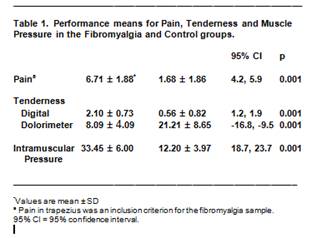Session Information
Date: Tuesday, November 7, 2017
Title: Fibromyalgia, Soft Tissue Disorders, Regional and Specific Clinical Pain Syndromes Poster II
Session Type: ACR Poster Session C
Session Time: 9:00AM-11:00AM
The Etiology of Fibromyalgia May be Related to Increased Muscle Pressure
Background/Purpose: The muscles are tender in fibromyalgia syndrome (FMS) patients, and the location of pain is generally over the muscles, as seen in body diagrams shaded in by patients with fibromyalgia. Previous research also showed a reduced lordotic curve of the cervical spine on lateral-view radiographs, suggesting a muscular etiology and possible increased muscle tension. We measured muscle pressure directly in patients with FMS and controls.
Methods: Fibromyalgia patients meeting the 2010 ACR criteria for the diagnosis were evaluated using a pressure gauge attached to a No. 22 needle, and 0.3 cc of saline was injected into the mid portion of the trapezius muscle of patients with fibromyalgia, and also into normal controls. The pressure in mm Hg was determined using this device. In addition, patients and controls had dolorimetry testing and manual compression of the trapezius muscles to determine the amount of tenderness.
Results: 103 FMS patients were evaluated, 88 females and 15 males. The mean age was 52 y o for females and 47.5 y o for males. The mean dolorimetry score in the FMS patients was 8.1mmHg (0-30). The muscle pressure in fibromyalgia patients averaged 33mmHg (22-43). The mean pain scale on a 1-10 visual analog scale, with 10 being the worst, was 7 in these FMS patients. In 16 fibromyalgia patients with mild muscle tenderness, the mean dolorimetry reading was 11.8, mean muscle pressure reading was 28.7 mmHg, and the mean pain scale rating was 5. In the 52 FMS patients with moderate tenderness over the trapezius muscle, the mean dolorimetry reading was 7.9, the mean muscle pressure score was 33.9 mmHg, and the mean pain score was 6. In the FMS group with extreme muscle tenderness (30 patients with fibromyalgia), the mean dolorimetry score was 6.6, the mean muscle pressure reading was 35.5 mmHg, and the mean pain scale rating was 8. In the controls, 7 males and 18 females, the diagnoses included 15 with RA, 6 with SLE, and 4 healthy office personnel. The mean dolorimetry score in this group was 21.2 (0-30). The mean muscle pressure was 12.2 mmHg (8.0-18.0). The mean pain VAS scale score was 2. Mild muscle tenderness was noted in 1 patient.
Conclusion: Patients with fibromyalgia, compared to controls, have significantly increased intramuscular pressure. Muscles were also tender and dolorimetry scores were low indicating decreased tolerance for manually applied pressure. The amount of muscle tenderness correlated with the muscle pressure. The pain in fibromyalgia may be related to increased muscle pressure and tension. Fibromyalgia patients may be unconsciously tightening their muscles. Though pain centers in the brain light up quickly (central sensitization) in fibromyalgia patients when pressure is applied to the muscles, this finding may be due to increased muscle tenderness and elevated muscle pressure in fibromyalgia patients.
To cite this abstract in AMA style:
Katz RS, Polyak JL, Katz Small A, Small BJ, Leavitt F. The Etiology of Fibromyalgia May be Related to Increased Muscle Pressure [abstract]. Arthritis Rheumatol. 2017; 69 (suppl 10). https://acrabstracts.org/abstract/the-etiology-of-fibromyalgia-may-be-related-to-increased-muscle-pressure/. Accessed .« Back to 2017 ACR/ARHP Annual Meeting
ACR Meeting Abstracts - https://acrabstracts.org/abstract/the-etiology-of-fibromyalgia-may-be-related-to-increased-muscle-pressure/

